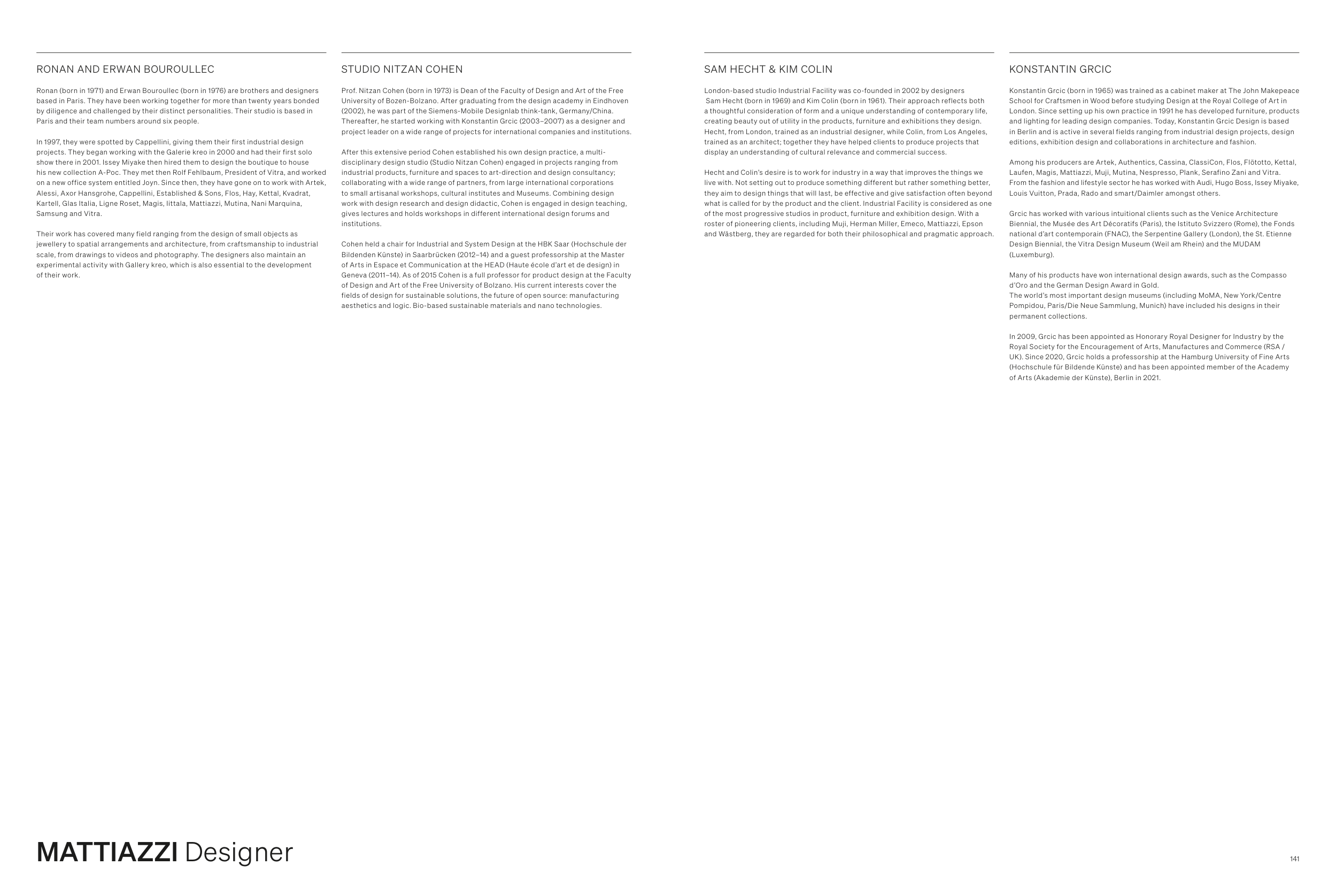RONAN AND ERWAN BOUROULLEC
Ronan (born in 1971) and Erwan Bouroullec (born in 1976) are brothers and designers
based in Paris. They have been working together for more than twenty years bonded
by diligence and challenged by their distinct personalities. Their studio is based in
Paris and their team numbers around six people.
In 1997, they were spotted by Cappellini, giving them their first industrial design
projects. They began working with the Galerie kreo in 2000 and had their first solo
show there in 2001. Issey Miyake then hired them to design the boutique to house
his new collection A-Poc. They met then Rolf Fehlbaum, President of Vitra, and worked
on a new office system entitled Joyn. Since then, they have gone on to work with Artek,
Alessi, Axor Hansgrohe, Cappellini, Established & Sons, Flos, Hay, Kettal, Kvadrat,
Kartell, Glas Italia, Ligne Roset, Magis, Iittala, Mattiazzi, Mutina, Nani Marquina,
Samsung and Vitra.
Their work has covered many field ranging from the design of small objects as
jewellery to spatial arrangements and architecture, from craftsmanship to industrial
scale, from drawings to videos and photography. The designers also maintain an
experimental activity with Gallery kreo, which is also essential to the development
of their work.
MATTIAZZI Designer
141
STUDIO NITZAN COHEN
Prof. Nitzan Cohen (born in 1973) is Dean of the Faculty of Design and Art of the Free
University of Bozen-Bolzano. After graduating from the design academy in Eindhoven
(2002), he was part of the Siemens-Mobile Designlab think-tank, Germany/China.
Thereafter, he started working with Konstantin Grcic (2003–2007) as a designer and
project leader on a wide range of projects for international companies and institutions.
After this extensive period Cohen established his own design practice, a multi-
disciplinary design studio (Studio Nitzan Cohen) engaged in projects ranging from
industrial products, furniture and spaces to art-direction and design consultancy;
collaborating with a wide range of partners, from large international corporations
to small artisanal workshops, cultural institutes and Museums. Combining design
work with design research and design didactic, Cohen is engaged in design teaching,
gives lectures and holds workshops in different international design forums and
institutions.
Cohen held a chair for Industrial and System Design at the HBK Saar (Hochschule der
Bildenden Künste) in Saarbrücken (2012–14) and a guest professorship at the Master
of Arts in Espace et Communication at the HEAD (Haute école d’art et de design) in
Geneva (2011–14). As of 2015 Cohen is a full professor for product design at the Faculty
of Design and Art of the Free University of Bolzano. His current interests cover the
fields of design for sustainable solutions, the future of open source: manufacturing
aesthetics and logic. Bio-based sustainable materials and nano technologies.
SAM HECHT & KIM COLIN
London-based studio Industrial Facility was co-founded in 2002 by designers
Sam Hecht (born in 1969) and Kim Colin (born in 1961). Their approach reflects both
a thoughtful consideration of form and a unique understanding of contemporary life,
creating beauty out of utility in the products, furniture and exhibitions they design.
Hecht, from London, trained as an industrial designer, while Colin, from Los Angeles,
trained as an architect; together they have helped clients to produce projects that
display an understanding of cultural relevance and commercial success.
Hecht and Colin’s desire is to work for industry in a way that improves the things we
live with. Not setting out to produce something different but rather something better,
they aim to design things that will last, be effective and give satisfaction often beyond
what is called for by the product and the client. Industrial Facility is considered as one
of the most progressive studios in product, furniture and exhibition design. With a
roster of pioneering clients, including Muji, Herman Miller, Emeco, Mattiazzi, Epson
and Wästberg, they are regarded for both their philosophical and pragmatic approach.
KONSTANTIN GRCIC
Konstantin Grcic (born in 1965) was trained as a cabinet maker at The John Makepeace
School for Craftsmen in Wood before studying Design at the Royal College of Art in
London. Since setting up his own practice in 1991 he has developed furniture, products
and lighting for leading design companies. Today, Konstantin Grcic Design is based
in Berlin and is active in several fields ranging from industrial design projects, design
editions, exhibition design and collaborations in architecture and fashion.
Among his producers are Artek, Authentics, Cassina, ClassiCon, Flos, Flötotto, Kettal,
Laufen, Magis, Mattiazzi, Muji, Mutina, Nespresso, Plank, Serafino Zani and Vitra.
From the fashion and lifestyle sector he has worked with Audi, Hugo Boss, Issey Miyake,
Louis Vuitton, Prada, Rado and smart/Daimler amongst others.
Grcic has worked with various intuitional clients such as the Venice Architecture
Biennial, the Musée des Art Décoratifs (Paris), the Istituto Svizzero (Rome), the Fonds
national d’art contemporain (FNAC), the Serpentine Gallery (London), the St. Etienne
Design Biennial, the Vitra Design Museum (Weil am Rhein) and the MUDAM
(Luxemburg).
Many of his products have won international design awards, such as the Compasso
d’Oro and the German Design Award in Gold.
The world’s most important design museums (including MoMA, New York/Centre
Pompidou, Paris/Die Neue Sammlung, Munich) have included his designs in their
permanent collections.
In 2009, Grcic has been appointed as Honorary Royal Designer for Industry by the
Royal Society for the Encouragement of Arts, Manufactures and Commerce (RSA /
UK). Since 2020, Grcic holds a professorship at the Hamburg University of Fine Arts
(Hochschule für Bildende Künste) and has been appointed member of the Academy
of Arts (Akademie der Künste), Berlin in 2021.


